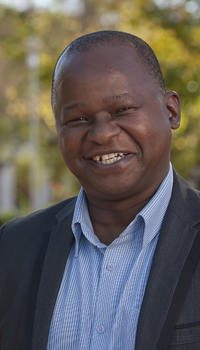Latest News Archive
Please select Category, Year, and then Month to display items
06 April 2018
Photo Rulanzen Martin
 From the left: Dr Thulisile Mphambukeli, leader of the BRICS research team that is exploring the political economy of water and food security, and her research partner, Dr Victor Okorie.
From the left: Dr Thulisile Mphambukeli, leader of the BRICS research team that is exploring the political economy of water and food security, and her research partner, Dr Victor Okorie.
A Brazil, Russia, India, China and South Africa (BRICS) delegation is to hold the 10th Annual BRICS Summit in the last week of May 2018 in Johannesburg. Dr Thulisile Mphambukeli, leader of the University of the Free State (UFS) research team alongside Dr Victor Okorie from the Department of Urban and Regional Planning, in collaboration with Prof Lere Amusan of North-West University, will ensure that water and food security is a prominent feature on the gathering’s agenda.
First, the project titled: “Exploring the political economy of water and food security nexus in BRICS and Africa” will debut at the National Institute for the Humanities and Social Sciences BRICS Think Tank Forum”.
According to Dr Mphambukeli, the key to water security is attitudinal change by means of education and conscientisation. This, she is adamant about, holds the potential to drive behavioural adjustments in the way society interacts with water.
Genetic and social approaches
Dr Okorie asserts that if strides towards reducing the demand for water were to be made, research efforts should be geared towards effecting changes at DNA level. Meaning we need to explore waterwise ways that enable crops and animals to thrive optimally.
The project also looks at social dimensions of water such as flushing a toilet. “Research activities on redesigning toilets, especially the urinal, where more than nine litres of water are used to flush less than one cubic centimetre of urine, are timely in the context of managing water and the food nexus crises,” said Dr Okorie.
Combining the genetic and social approaches would allow us to produce more with a smaller water footprint. This can be made possible by implementing precision agriculture which is about estimating and applying exact quantities of water and nutrients needed for the production of crops or the raising of livestock.
Paradigm shifting policies
Prof Amusan said the team intended to propose functional solutions that take the quality of water into consideration. Equitable production and distribution of water depends on endorsing policies of co-production between citizens, governments and the public sector. BRICS member states mutually consider water and food security as an issue of paramount significance, hence its feature on this prestigious summit’s agenda.
South African citizens are yearning for a good story to tell
2014-03-13
|

Dr Sethulego Matebesi
Photo: Sonia Small |
The 20 Year Review is in essence a continuation of President Jacob Zuma’s State of the Nation Address and the ‘we have a good story to tell’ narrative. The report provides a glowing picture of successes achieved over the two decades. The successes highlighted include the basic human rights enjoyed by South Africans, a marked improvement in economic growth, and the provision of social services such as health care, education and housing. And as expected, the Review is dedicated to Nelson Mandela.
The major accomplishments were made through the strategic policies of the ruling African National Congress (ANC). For example, emphasis has been on improving the lives of South Africans through pro-poor economic interventions, in building social cohesion, investing in economic infrastructure, fighting HIV and AIDS and tuberculosis, which resulted in improved health outcomes.
Generally, the assertions about ‘accomplishments’ have been made against solid evidence and are thus not debatable. What overshadows the 20 Year Review, is the story that is not being told. This is the story of a political economy marred by rampant corruption, high levels of unemployment, declining accountability, and unresponsiveness. This untold story has become the hallmark of President Zuma’s tenure. Meanwhile, the average South African citizen is still yearning for ‘a good story to tell.’
For more political comment or to speak to Dr Matebesi, please call René-Jean van der Berg at +27(0)83 645 5940.